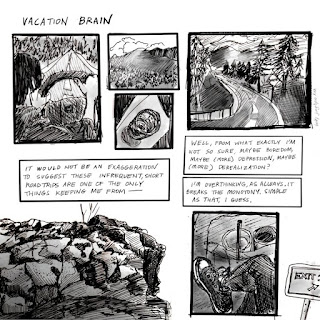Juniper Kim is a promising first-year student at CCS. She's embraced a wide variety of styles and genres and has shown a great deal of skill in all of them. She submitted a number of short comics for this project.
In the category of "narrative comics," Kim started with "Laborers Of Love." I'd say this is as poetic as it is about narrative, and it seems obliquely about pandemic times, as well as imagining a life in a post-capitalist world. It's about human connection and an understanding of how those structures directly impede it, and her use of wavy lines a pink-purple wash doubled down on this emotion. Some of the line art in the panels was obscured by the wash at times, but for the most part, it worked well in intensifying it. "Head/Heartaches" is a bit of autobio where Kim reflects on mental illness and physical pain, and how accepting one's imperfections instead of trying to rid yourself of them is crucial to self-acceptance. Kim's immersive style is highly effective here, as the moody purple and use of shadows effectively conveys this inner conflict. "Every Flavor A Ghost," written by Noah Cho, sees Kim use a different visual technique. It's a more standard grid, as she's relaying Cho's sensory memories and how they connect him to his grandmother. The colors are more balanced and varied while still quite vivid, and Kim successfully adapted a more naturalistic style.
Kim also submitted three "political cartoons." The first, "Psychiatrist's Office," is actually a pretty good gag. The background features a tearful patient (presumably Kim, but it doesn't matter), while the foreground sees the psychiatrist doodling cubes and fancy logos like a junior high schooler. "All My Flaws And Why They're Not My Fault" is a simple Venn diagram, cleverly inverting the negative stereotypes of being Asian, "womanly," and bisexual to explain her poor driving, tardiness, and impulsivity. When traits are reified by society, why not turn them around? "Making Friends As A Person Of Color In Vermont" has Kim introducing herself and the woman she's being introduced to pouring out a litany of liberal concerns that ignores her actual personhood. The only problem with the gag is that it's mostly textual.
There were also two diary comics, both short (the best kind of diary comic). "I Want To Be A Girlboss But" is in black and white with grayscale shading, and Kim really shows off her line and clever use of a gird here. It's Kim in a shower, thinking about what's important and what's not, and how difficult it is to engage in things like hygiene when depressed. Like all of Kim's work, though, it's less about personal depression and more about existential malaise in general, especially with regard to the expectations of others with regard to "work." "Vacation Brain" may be her best piece; it's about self-reflection and overthinking in the context of how car rides and day trips keep her from going totally over the edge. There's an interesting take on the concept of vacation and how approaching vacation time as something totally great avoids the idea of returning to your regular, terrible life. It's another existentialist thought, akin to the idea of angst in confronting the idea of the void. I thought some of the storytelling was a big cramped; I wished for a bigger page to let some of those early panels breathe and get a real sense of the Vermont countryside.
Kim submitted three comics-as-poetry pieces. "ACH" is a black and white piece with shifting pencil tones, possibly indicating light and/or wind in a vague environment, spread over a six-panel grid. Kim's command over her pencil makes this piece interesting to look at. "Alienation Triptych" is a collage of various colorful images from daily life and the environment, assembled in a jagged, abstract manner. The text relates to Kim's theme throughout: the thorny issue of mental illness, conformity, and "neat" vs "messy" living. It's ultimately about the desperate urge to connect. "Love Letter" is not a letter to a particular person, but to Love itself. It's about the desire not just to love in the moment, but also to have the sense of a tomorrow that will come where love will also exist. Kim paints it as delusional but necessary, and her blurry use of deep, bruised purples backs up this conflation of love and deep, sleepy darkness.
Finally, Professor Foxglove's Fungal Fantasia is a mini drawn in the style of a kids' comic, even if the professor in question is exposed to magical, musical mushrooms. This is a trippy, weird bit of fun, but it also displayed Kim's range in proving she's adept at multiple kinds of storytelling. She can pretty much do whatever she wants in comics; she'll just need to figure out what it is she wants to do.







No comments:
Post a Comment